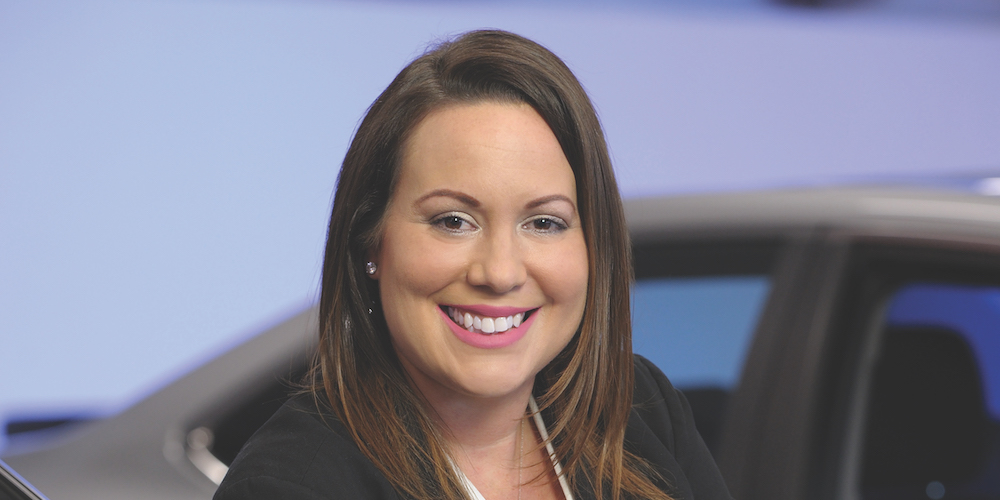Toni Anne Fardette is the Director of Business Development for the Atlantic Auto Group ($1.1 Billion Dealer Group) in Long Island, New York. Atlantic brands include Lexus, Audi, Hyundai, Toyota, Honda, Ford, Lincoln, Nissan, Volkswagen, Chevrolet, Jeep, Dodge, and Chrysler. With over 2,200 employees, Atlantic is a major employer in Nassau and Suffolk Counties.
Toni Anne’s responsibilities include digital marketing for the group, which currently consists of 24 stores; creating, maintaining and measuring the internet and business development processes for all stores on behalf of the partners; developing and maintaining the new hire and interview process for all appointment coordinators and business development managers; as well as conducting ongoing and consistent internal training courses for the Atlantic Automotive Group. Her team of 19 BDC managers and 82 appointment coordinators delivers anywhere from 5,000- 5,600 units per month.
In the following interview, Toni Anne shares with us her considerable insights on how to set up and manage a successful Business Development Center. She also talks about the challenges of juggling work and home, as well as the winning formula she uses to create a proper balance between those two commitments.
Toni Anne, you started in the auto industry as a receptionist and today, more than 15 years later, you are the Director of Business Development for the Atlantic Auto Group, a billion-dollar enterprise and the eighth largest dealer group in the country. Could you fill us in on this amazing journey; in other words, how did you get from there to here?
I started as a part-time receptionist in 2000. It was not my intention to pursue a career in automotive. It was just a part-time job while I was attending college. About six months after I started, was when BDC was kind of born within the industry. I noticed that department was made up of only two people, and they were able to control how much they made in terms of income because of the additional monthly commission. So, I thought if the general manager would be willing to accommodate my school schedule, I would rather do that, with the chance to make more money. Because that has always been my personality type: how can I take whatever I’m doing to the next level? I spoke with the general manager and he was able to accommodate my school schedule. Basically, I went to school from 6 a.m. to 9 a.m. and then worked at the dealership until the evening.
At this point, it was probably 2001, when “internet,” not the way we know internet today, but when the internet was starting to become a thing. Back then, it was just a contact form on your website. We had an AOL email address for the dealership, because there really wasn’t a CRM yet. We would correspond with that customer via the email address or by phone. The general manager asked me if I would be interested in managing this new internet department. That was technically a promotion, and I became the internet manager. We were delivering 40 to 60 units each month out of the internet department, which was a big number at the time.
I did that for about a year, at which point I realized there really wasn’t any room to grow with that company. So, I went to work for another Toyota dealer on Long Island as their BDC manager and stayed with them for about five years.
I wanted to take my career to the next level, which meant I would probably have to work for a dealer group. I was speaking to an OEM rep about wanting to grow and that person told me Huntington Toyota, which was also on Long Island, was looking for a business development manager, and they are part of the Atlantic Auto Group. I went to the interview and they hired me. I worked in that store, running the single-point BDC, from 2008 until 2010.
In 2010, I had my son and considered not returning, taking a couple of years off while he was young. Shortly thereafter, the managing partners, Michael Brown and John Pickett, called to offer me the position of BDC director and have me oversee all the business development departments and work out of the corporate office. I had been planning to stay home with my son but this is what I had been working toward. So, after speaking with my husband, we decided that we would make it work. I formally accepted the position in April of 2011. And that’s how I got here. When I took that position, we had 11 or 12 stores and now we have 24.
You’ve certainly enjoyed great business development success. What’s your BDC philosophy?
First of all, to lead by example. I spend a lot of time nurturing and coaching and counseling my BDC managers – there are 19 of them. We have 24 stores, but I have a couple of managers who oversee multiple points. These 19 managers all report directly to me. We are not in the same building, and we’re not centralized. I still try to spend as much time as possible with them building leadership skills. I think there is a huge difference between a leader and a manager or supervisor, and I think that’s what makes a difference between an average or a good BDC and an above average or great BDC. So, my first philosophy would be lead by example.
My second piece of that, which we’re constantly talking about and working on, is always being open to new ideas. This industry is ever-changing, especially in the digital sphere, which is really a good piece of what BDC is handling now. I think you have to be open to change. Actually, I’m currently rebuilding our BDC process from what it was so that we can be more transparent with the customer versus the standard run-of-the-mill script and the old-fashioned process. My second part of my philosophy is to be open to that change and to other ideas.
What advice would you give a dealership planning to start or improve its own BDC operation?
First off, make sure you have the right people. If you don’t have the right people in place, the rest is a moot point. How do you know you have the right people? It starts with a solid interviewing and hiring process. You want to evaluate the people you already have. I would start from scratch and do some kind of interviewing-counseling-coaching session with those people to make sure everybody is paddling the same way in the boat. Eliminating anybody who doesn’t fit, anybody who is negative or toxic, people who don’t agree with the culture or mission statement or mission of the dealership.
Once you know you have the right people, for me, it’s all about metrics. That really needs to be a daily conversation and not just focusing on appointments but looking at staffing. Who do you have by individual and then by type. By those different types and by the different employee, how many calls are they making? What is their connection ratio? How many appointments are they making, what’s their show percentage, their sales percentage? You can find anything and everything in there. I don’t need to physically be in a store to be able to tell you what’s going on. I’ve mastered the art of reading into those metrics so well that simply by looking at metrics I can identify the problem.
Could you walk us through a typical day in the life of your BDC managers?
They normally work an early schedule. We do that on purpose and prefer to have them be one of the first ones in. Generally, they’re in about a half-hour before their staff. We want them to begin to sift through any new internet leads that came in the night before and after closed business hours. We do that because we want them to be the first touch-point.
We want them to send out that first email, which should be a personalized video email from the BDC or internet manager directly. Obviously, we want to make sure they’re doing it because we want to make sure it is not just personalized but compliant to the manufacturer, if need be. And, also, it frees up the BDC rep, so when reps get in at 9 a.m., they can get on the phone.
After the BDC or internet manager goes through those leads, the next thing they’ll do is go through the leads that came in the day before in terms of their appointments. They’re doing that throughout the day as well. They’re going to go back and double-check for the evening appointments. Did they show up? If they did, did they purchase or lease? If they did not show up, the manager will call them. They will call the no-shows. That is something that’s mandatory. The call must be made by the manager and not by the person who scheduled the appointment. At that point, the manager will reconfirm any appointments that had not already been reconfirmed for the day.
Monday through Friday they are required to hold a 15-to-30-minute group training session with their people. And that can be phone training, CRM training, or some kind of motivational session, leadership training. We do want two or three of them to be phone-skills related. The other two is up to their discretion but they must hold those sessions. After that, they pretty much break off. We’ll spend 10-to-15 minutes with each individual, because individuals are always at a different level. We go through where they’re at once a day: are they going to hit their objective? If they’re not going to hit their objective, how can we help them? We kind of break those metrics down with the rep, giving them a plan of action. How many managers sit and do that, in BDC or Sales, on a daily basis? Many do that every now and then, especially when a store is failing, but I think it should be done daily. There’s a saying: All it takes to have a good month is four good weeks. But when once a month is gone, it’s gone. If you’re on top of it on a daily basis, you can usually make up for those deficiencies.
They’ll do a quick website review. Whether it’s five or ten or fifteen minutes every day, they must review their website. We’re always encouraging they do that daily. At that point, it’s usually about time to wrap it up for the day. They’ll do a recap of what’s taken place so far. Just kind of figuring out the metrics for the day prior to leaving and the next morning repeating the process and going over those metrics, where they left off. That’s pretty much their standard day.
How important is the CRM to a BDC’s success?
Very, very important. When I’m talking to other dealerships and dealer groups, whether it’s people I just know from my time in the business, online forum, social media, auto group, and so on, I’m constantly seeing a CRM battle. They’ll say, we can’t get the salespeople to use the CRM correctly. We have a pretty solid handle on that. However, no store is perfect and you’re always going to have that handful of people who don’t quite get that. In this group, we live and breathe CRM. It is the internet or BDC’s manager’s responsibility to keep that CRM data clean. So, they spend a little bit of their time in the morning going through what was entered in the CRM the day before, to make sure it was entered correctly.
Then, there’s the act of cleaning it up, in case something was entered incorrectly, and then turn that into a coaching or training experience. And that’s the thing I think most dealerships don’t get or don’t want to spend the time addressing. We automatically just want to assume some people just won’t use the CRM. I don’t know if that’s true. I think the problem is we don’t spend enough time training them. Again, we live and breathe by our CRM, so the data has to be correct.
How do you utilize social media?
We use it organically and we do campaigns as well. And we do that both from a group perspective – we have an NY Auto Giant account, which we use to push out organic content. We also have a page strategy and we will also have the dealers do it at the dealership level. So, we have organic and their own ad budget for their store, which is up to the discretion of the general manager.
You hear a lot about search engine marketing—and yes, there’s still a need for that—and you’ll want to spend money there, too. But that cost is so astronomical for such a little return. Whereas, if you do Facebook page advertising correctly, you’re spending minimal, minimal, minimal amounts of money and being able to hyper-target any group, really. I’ll give you a for instance.
A couple of weeks ago, Hyundai put out an additional incentive for military. Okay, we could advertise that on our website. But, again, are we drilling down? Is everyone coming to the site military? Is everyone clicking on that piece military? Probably not. So, on Facebook we’re able to say, okay, we want to send this message to those specifically who identify themselves as military. Now, it’s a smaller audience, yes, but it’s a more relevant audience and the spend is significantly less than what you would spend trying to advertise that offer digitally or as far as search engine marketing or traditionally, whether it’s a newspaper ad, a cable spot, a radio spot. That’s kind of the strategy we take.
We also use paid Facebook marketing for a lot of our hiring and recruiting. Again, because you’re able to change your ad and target specifically. There’s one kind of ad you might want to show when hiring, say, a millennial versus the kind of copy I might like when hiring a veteran sales person. You have the capability to do that and target specifically on Facebook. I think it’s a great and cost-effective way when used correctly.
What is the one piece of technology in your tool chest that’s indispensable?
Hands down, it’s our CRM. I don’t think you could operate nearly as efficiently without one. We use DealerSocket as a CRM, across the auto group, and we’re very pleased with how it’s working.
Let’s shift gears away from technology and talk about people. What do you look for when hiring new staff?
Well, for BDC management I generally do look for experience. We do have our own way of doing certain things, and, obviously, we’ll show them what our processes are. We would definitely want someone who would have automotive, BDC and internet management experience.
Believe it or not, though, for reps we look for the exact opposite. I would prefer to hire reps that do not have any internet or BDC experience. What I look for, generally, is people who have worked with people. Whether it is in the service industry, such as a server or a hostess, or a bartender. People who have worked in retail.
People who have worked in call centers and are used to making a large amount of outbound calls, as well as taking a large amount of inbound calls on a daily basis. I look for those kinds of things, because those are the skills that are necessary to get the job done. I think BDC things are teachable. But you cannot teach being able to relate to people, just being that people person. Somebody has it or they don’t. People who have had years of experience in those fields I mentioned, generally do.
I prefer to start fresh and train them to do things the way we’d like them to do them. I have about five or six of my internet directors who started out that way. I trained them, and now, for the last couple of years, they’ve been running internet departments of their own.
I’d like to bring our conversation to a more personal level. You’re a working mother with two children at home. What challenges have you faced juggling work and home?
About two years ago, I mastered the art of work-life balance. I’ve always had very good, probably above average, time management skills. But that was a gift and a curse. Having those time management skills was why I was trying to get too much done at work and at home all in one day. So, I told myself I had to use those time management skills to get more balance.
Now, I set aside specific times when I have to shut off. When I’m at work, which is generally nine to five, Monday through Friday, I’m at work. That’s it. Barring an emergency, I’m working, that’s what I’m doing. I don’t take my focus off of that. My days are always planned out the night before. What’s non-negotiable that day, what needs to get done, what can be put off, if it has to be. I actually start planning for the week on Sunday night. Then, when I leave here, I leave here.
That’s my time with my children. Again, unless it’s an emergency, I make it a habit to not answer my cell phone, to not check my emails, and that’s generally going to be between the hours of six and eight. At eight o’clock, I’ll usually take another half-hour to check the phone, check emails, again just to make sure there’s nothing urgent. If it’s urgent, I take part of that half-hour to respond; if not, I’ll move on. Then, I’ll take about an hour for myself at night, where I’m winding down and relaxing. I’m a big reader, which is generally how I relax and what I do in the evening.
From the time when my kids wake up in the morning until we walk out that door at eight a.m., that’s their time. I am not working. I have people (and this is one of my pet peeves) whether it is vendors or co-workers who will text me at seven-fifteen, seven-thirty in the morning and, again, if it’s not urgent, I’m not responding to it. That is my time with my kids.
I’ll do the same thing on the weekends. Saturday, if there’s some extra work I need to catch up on, I’ll fit it in and plan that out. On Sunday, I teach Sunday school in the morning, then I go to church service, and the rest of the afternoon is family day and, again barring an emergency, I’m not working. I really try to stick to that, and when I do stick to that, it’s been extremely helpful.
Let’s look ahead for a moment. What does the BDC of the future look like?
I think it has to become a kind of hybrid model, what I’m calling a “customer concierge center.” What I mean by that is you read a lot of articles by vendors out there who are trying to sell something and they’re claiming you don’t need a BDC, that a BDC has had its day, they’re going to be extinct. Well, yes and no. If BDC’s continue to operate the same way, they may well become extinct. I think that the misconception is because everything is so transparent now on the web and that’s what customers want. Transparency.
They want to be able to go online and just get information, know what the payment is going to be, know what the price is going to be. Do I think we’re at the point yet where people truly don’t want any interaction with a dealership? No, I don’t. Will we get there at some point? Probably, but I don’t know if I’ll still be alive to see it. Today, I think that’s a very, very small percentage of people. I think the majority of people still want to come into a dealership and interact.
What they don’t want is the nonsense, the back and forth negotiating. They don’t want to have to come in with their guard up. They don’t want to have to go through fifteen back and forth negotiations, with the salesperson running back to the sales manager. A lot of dealerships don’t even get that. So, their websites are not transparent. And I hear it a lot. I’ll be frank. I even hear it from our own managers. They tell me they don’t want to put that information out there. Guess what? It’s out there anyway. The only thing you’re doing by not providing that information is pushing the customer to a third-party site. If we provide all the same transparent information on our site, why would they need to go to a third-party site where competitors are also listed? Or, they’re trying to eliminate the dealer all together, in the case of a Carvana or something like that.
I think the initial introduction to a customer, whether it is a phone call, email, text message or however that customer prefers to communicate, needs to be more about providing transparency, information the customer is looking to get. Also, acknowledging if they went to your website, what parts of the process they went through. Again, using that, as a customer concierge, to sell, doing these things are going to save time in the dealership, and make them feel more comfortable with the transparency they are receiving. Their guard is not up when they finally do come in to the dealership.
I think the BDC needs to be trained more on product knowledge and pricing. Whereas, going back years ago that was like a complete no-no. I think they need to be trained more like sales people to a certain extent. However, we need to recognize that we need to communicate, at least initially, through whatever medium the customer feels most comfortable using, whether that’s chat, text, email, or video. I think a lot of dealerships don’t want to do that because it doesn’t work for them. Well, too bad. Because if that’s how the customer wants to communicate, then you need to be trained in how to do that. And I think that is where the BDC of the future needs to go, if it is going to survive.
What is the one word or phrase that best describes you or your business philosophy?
I would say, “No excuses.” Actually, I have a sign in my office that says, “No negative thoughts or excuses or giving up allowed here.” That would probably be my go-to phrase.
Meet Toni Anne and learn more about her BDC approach at the Digital Dealer Workshops on Feb. 13-14th in Chicago, where she will be a panelist on the opening Keynote Panel, as well as presenting a breakout session. Have a question for Toni Anne? You can email her here: [email protected].








